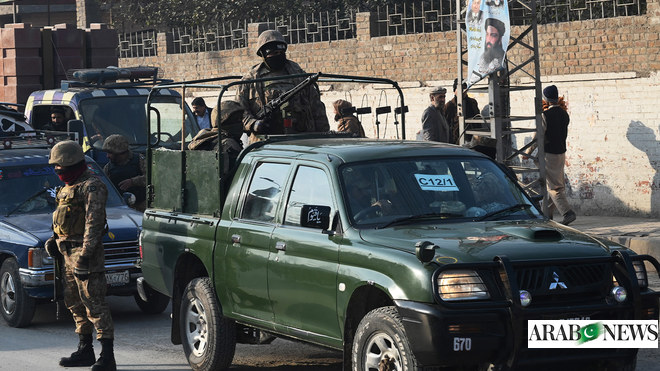Experts warn of challenges to state warrant as northwest Pakistan becomes ‘epicenter’ of militant violence
KARACHI: Pakistan’s northwestern province of Khyber Pakhtunkhwa (KP) has become an “epicenter of violence,” according to a new report released this week, with security experts warning that militants are likely to challenge provincial authority in parts of the province as the federal government lacks the popular and political support to launch a military operation.
According to a report titled “Profile of Pakistan’s Security Situation Q2-2024” released by the Islamabad-based Centre for Research and Security Studies (CRSS), Pakistan reported 240 terror attacks and counter-terror operations in the second quarter of this year, leaving 380 dead and 220 injured among civilians, security personnel and outlaws.
The report said Khyber Pakhtunkhwa province had the highest death toll from April to June 2024 at 67 percent, followed by Balochistan at 25 percent, while the rest of the country was “relatively peaceful.”
“This is consistent with reports of widespread insecurity across the province and a large influx of TTP fighters from Afghanistan into Pakistan, which could threaten the Pakistani government’s control over parts of the province,” Dr. Asfandyar Mir, a senior expert at the United States Institute of Peace, said of the report’s findings of increasing militant violence in KP.
Islamabad blames the militant group for a recent surge in attacks on neighbouring Afghanistan, alleging that Pakistani Taliban militants are setting up camps and training militants to carry out attacks inside Pakistan, a charge Kabul denies.
Despite Afghanistan’s denials, the TTP’s presence in Afghanistan has been documented by the United Nations and countries around the world, Mir said.
Pakistan’s military has carried out a series of operations in the tribal areas since 2014 that have effectively dismantled the TTP, killing most of its top leaders and driving most of its fighters into neighboring Afghanistan, where Islamabad says they are regrouping, a charge Kabul denies.
The surge in attacks prompted the federal government to announce last week the launch of a new counter-terrorism operation, “Azm-e-Istekam,” but the operation has so far been opposed by the opposition.
Ihsanullah Tipu Mehsud, who runs the online security publication Khorasan Diary, said the announcement of the Azm-e-Istehan incident itself showed the “gravity” of the deteriorating security situation in Khyber Pakhtunkhwa.
“Over the years, militants have regrouped and launched series of attacks periodically, taking the situation back to the pre-2014 era,” Mehsud told Arab News, the year Pakistan launched its full-scale Zarb-e-Azb military offensive against militants in the Afghan border region.
“The people of Khyber Pakhtunkhwa, especially those in the former FATA region, are once again caught in a showdown between the Pakistani Taliban and the government,” Mehsud said. “Ironically, this time the government lacks the political and public support for a new military offensive, posing a major challenge to effectively wage counterterrorism operations against the militants.”
Both militant groups – the Pakistani Taliban and Baloch separatists – have increased their revenues in recent years through “border trade, extortion and Iranian oil smuggling”, while the government has faced increasing “financial difficulties”.
Mir said Pakistan’s leaders were also put in a “difficult position” by the Afghan Taliban, who continue to urge the government to negotiate a ceasefire with the TTP.
“They have not restricted the TTP’s violent activities and are therefore complicit in its actions,” Mir added. “Meanwhile, domestic opposition to the recently announced operation will not help.”
“Pakistan’s leaders need to think rationally. Finding a balance that can address this complex challenge will take time.”

